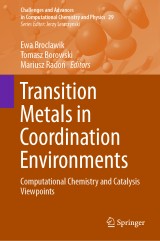Details

Transition Metals in Coordination Environments
Computational Chemistry and Catalysis ViewpointsChallenges and Advances in Computational Chemistry and Physics, Band 29
|
CHF 177.00 |
|
| Verlag: | Springer |
| Format: | |
| Veröffentl.: | 16.03.2019 |
| ISBN/EAN: | 9783030117146 |
| Sprache: | englisch |
Dieses eBook enthält ein Wasserzeichen.
Beschreibungen
This book focuses on the electronic properties of transition metals in coordination environments. These properties are responsible for the unique and intricate activity of transition metal sites in bio- and inorganic catalysis, but also pose challenges for both theoretical and experimental studies. Written by an international group of recognized experts, the book reviews recent advances in computational modeling and discusses their interplay using experiments. It covers a broad range of topics, including advanced computational methods for transition metal systems; spectroscopic, electrochemical and catalytic properties of transition metals in coordination environments; metalloenzymes and biomimetic compounds; and spin-related phenomena. As such, the book offers an invaluable resource for all researchers and postgraduate students interested in both fundamental and application-oriented research in the field of transition metal systems.
From the content: Review of the current status of knowledge in the field of recent achievements in computational modeling and their interplay with experiment.- Density matrix renormalization group (DMRG): An emerging method in bioinorganic chemistry.- Approaching magnetic interactions in oligonuclear transition metal clusters with density matrix renormalization group.- New strategies in modelling electronic structures and properties in actinides.- X-ray probes of electronic structure in transition metal complexes.- Electronic spectroscopy of cobalamins studied with density functional theory.- Spin magnetic properties of transition metal complexes.- Computational studies of transition-metal catalysis in biological and non-biological settings.- The role of non-covalent interactions in metal complexes.- Molecular electrochemistry of coordination compounds - a correlation between quantum-chemical calculations and experiment.- Computational modelling of structure and catalytic properties of supported group VI transition metal oxide species.- Catalytic properties of TM in inorganic coordination environments.- Challenges in modeling metalloenzymes and their troubleshooting.- The quest for accurate theoretical models of metalloenzymes: an aid to experiment.- Metal coordination in the active sites of selected metalloenzymes: a theoretical point of view.- Metal – redox-active ligand cooperation in biomimetic transition metal compounds to exhibit metal-centered multi-electron reactivity.- Computational vs. experimental spectroscopy for transition-metals.- The electronic determinants of spin crossover described by density functional theory.- Photodeactivation channels of transition metal complexes: a computational chemistry perspective.
<div><b>Ewa Broclawik</b> is a Professor Emeritus and former Full Professor at the Jerzy Haber Institute of Catalysis and Surface Chemistry, Polish Academy of Sciences in Krakow, Poland. Her research interests focus on theoretical and applied quantum chemistry, in particular on the modeling of active sites in heterogeneous and enzymatic catalysis and on catalytic reaction mechanisms. Dr. Broclawik is the author of more than 180 publications, including 9 book chapters. </div><div> </div><div><b>Tomasz Borowski</b> is a Full Professor at the Jerzy Haber Institute of Catalysis and Surface Chemistry, Polish Academy of Sciences. His research interests encompass computational chemistry, biochemistry, reaction mechanisms, metalloenzymes, and protein structure and dynamics. Dr. Borowski has published more than 60 research papers in refereed journals as well as 3 book chapters.</div><div> </div><div><b>Mariusz Radoń</b> is an Assistant Professor at Jagiellonian University,Krakow, Poland. His primary research interest is in quantum chemistry, especially its applications to transition metal complexes and active sites of metalloproteins, with a focus on electronic structure, spin-state energetics, metal–ligand interactions and connections to catalytic activity. Dr. Radoń is the author of 30 publications, including 1 book chapter. </div>
This book focuses on the electronic properties of transition metals in coordination environments. These properties are responsible for the unique and intricate activity of transition metal sites in bio- and inorganic catalysis, but also pose challenges for both theoretical and experimental studies. Written by an international group of recognized experts, the book reviews recent advances in computational modeling and discusses their interplay using experiments. It covers a broad range of topics, including advanced computational methods for transition metal systems; spectroscopic, electrochemical and catalytic properties of transition metals in coordination environments; metalloenzymes and biomimetic compounds; and spin-related phenomena. As such, the book offers an invaluable resource for all researchers and postgraduate students interested in both fundamental and application-oriented research in the field of transition metal systems.
Reviews modern quantum chemical approaches to difficult cases involving transition metal systems Helps readers to select suitable tools for computational modeling Provides a broad perspective on the interplay between electronic structure and chemical and physical properties of transition metal systems, and on the application of these systems in catalysis Covers state-of-the-art methodologies and recent applications Discusses synergies between, as well as strengths and weaknesses of, computational modeling and experimental techniques

















